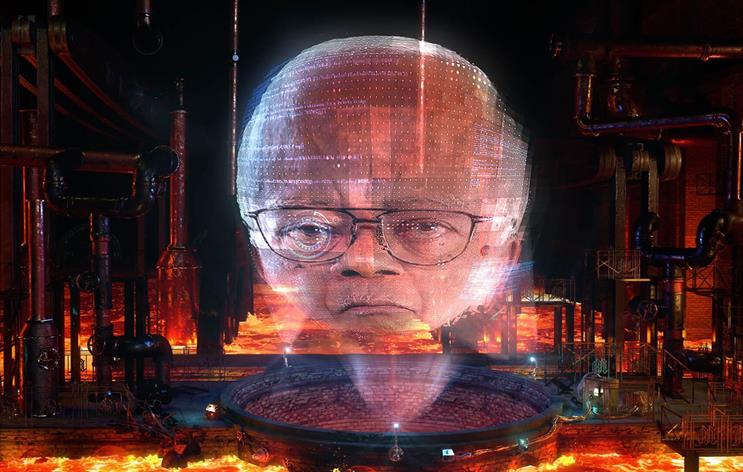
The integration of product and content is a thorny challenge for media partnerships but the alliance between Channel 4 and the virtual reality headset Meta Quest appears to have cracked the code with the reboot of the cult 1990s video-gaming show GamesMaster.
In November 2020, Channel 4 launched their Future4 strategy with the aim of diversifying their revenue streams, audience and programming. There was a commitment to ‘create change through entertainment’. “We also said that we were going to make lots more distinctive brilliant programming for young viewers,” said David Amodio, deputy head of commercial innovation and 4Studio at Channel 4.
The original GamesMaster first aired on Channel 4 in 1992 and ran for seven series. It was hosted by Dominik Diamond and featured the late Sir Patrick Moore as the omniscient, holographic Games Master. The 21st century version has three presenters: comedians Rob Florence and Ty Logan, and esports presenter Frankie Ward. The new Games Master is Sir Trevor McDonald. The reboot has a more magaziney feel to it than the original and was likened to Top Gear by Guardian reviewer Stuart Heritage.
“We saw this as a chance to entertain our audience instead of interrupting them,” explained Ian Gambier, EMEA creative director of Reality Labs at Meta. “As advertisers we spend a lot of time interrupting people when they’re leaning out and this was a chance to engage them when they’re leaning in. Because this was a reboot you had an older audience as well as the newer younger gaming audience. So it was a really good fit for us because we’re speaking to quite a broad gaming audience.”
The social-first launch
Trying to capture the older audience who remembered the original while engaging with younger gamers called for a two-pronged approach. GamesMaster premiered on E4’s YouTube channel on a Sunday evening and was then broadcast on E4 the following Wednesday (as well as being available on the All4 archive).
Instant reaction
“Gamers are a very opinionated audience so we knew they’d be the first people to let us know if we’d messed up,” joked Gambier. There were nerves aplenty when the first episode aired late last year but the benefits of a “live read” are obvious. According to Gambier, reaction was overwhelmingly positive with the only gripe being the desire for more episodes.
The purpose of the partnership
Following Meta’s significant customer research into VR, they set out to correct three misconceptions about their headset: on price (many over-estimated the cost of Meta Quest at £500 when in fact it’s £299); range of content (there are 300-plus titles available to play); and on the VR experience (that it’s actually an inherently social experience rather than a solitary one as some people think).
“The big creative goal,” added Gambier, “was to integrate the product into the show as seamlessly as possible. We talked a lot about awareness, consideration and conversion. And we were able to tick all three boxes with idents, branded content within the show itself, homepage takeovers... So it’s made for an effective partnership.”
Trust in the talent
“Talent is always a big debate for brands because they do become brand ambassadors whether they’re supposed to or not,” said Amodio. “As the broadcaster we like to maintain editorial integrity and control. We appreciate how collaborative Meta has been in the process [of talent recruitment] and how they let us get on with it.”
Gambier added that Meta Quest had only two non-negotiables: the first was to retain the irreverend charm of the first series, the second was diversity, equality and inclusion. He described the choice of legendary ITN newscaster McDonald as “an iconic casting decision”, adding, “I think we can attribute a lot of the press and hype around the show to that”.
Production integration: common ground
“Brands, particularly electronics brands, have an agenda of things they want to talk about,” said Gambier, “but we knew if we went down that route our audience would crucify us and Channel 4 probably wouldn’t have allowed it either so we had to find common ground.”
That common ground was gamers having fun. “Start with your audience and understand what they want from the show – don't start with what you are trying to say,” Gambier added. “That led us to a pro-gamer doing a Beat Saber world record and an epic grudge match between two gamers in a haunted church with the loser having an ice bath.”
Top tips: stay focused & think funny
Gambier believes the key to a successful campaign like this is to “understand your north star”. He added: “What unites the brand, the channel, the production partners and the audience? Otherwise, every decision feels like life or death with everyone pulling in different directions. For us, the north star was to keep that irreverent charm of the original but evolve it and make it work in a gaming landscape that has changed irrevocably.”
And Gambier asserted that “you need to train your brain to not think like a marketer and start to think like a stand-up comedian”. The point being that you need to maintain the audience’s attention. Amodio agreed that “brands do lose track of that” and “get caught up in the detail”.



